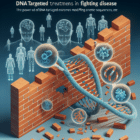"Breaking Down Barriers: The Power of DNA Targeted Treatments in Fighting Disease"
Breaking Down Barriers – The Power of DNA Targeted Treatments in Fighting Disease
In recent years, there has been a major breakthrough in the field of healthcare – DNA
DNA (Deoxyribonucleic Acid) is a molecule that carries the genetic instructions used in the growth, development, fun... More targeted treatments. This groundbreaking approach to medicine has shown immense promise in fighting various diseases and conditions, by targeting the root cause at the genetic level. Let’s delve deeper into the power of DNA targeted treatments and how they are breaking down barriers in healthcare.
The Basics of DNA Targeted Treatments
- Personalized Medicine: DNA targeted treatments are based on the idea of personalized medicine, where treatment plans are tailored to an individual’s unique genetic makeup. This allows for more precise and effective treatment strategies.
- Genetic Testing: Before starting a DNA targeted treatment, patients may undergo genetic testing to identify specific gene mutations that are contributing to their condition. This information can help healthcare providers create a targeted treatment plan.
- Targeted Therapies: DNA targeted treatments involve using medications or therapies that specifically target the genetic mutations driving a particular disease. This approach is often more effective and has fewer side effects compared to traditional treatments.
- Preventative Approach: By targeting the underlying genetic causes of disease, DNA targeted treatments can also help prevent the development of certain conditions in individuals with a higher genetic risk.
The Impact on Disease Management
DNA targeted treatments have the potential to revolutionize the way we manage and treat various diseases. Here are some key ways in which this approach is making a difference:
- Cancer Treatment: Targeted therapies for cancer can attack specific mutations in cancer cells, leading to more effective treatment outcomes and improved survival rates.
- Cardiovascular Health: DNA targeted treatments are being used to identify genetic risk factors for heart disease, allowing for early interventions and personalized treatment plans to prevent cardiac events.
- Neurological Disorders: In conditions like Alzheimer’s and Parkinson’s, DNA targeted treatments are helping to uncover genetic factors that contribute to disease progression and develop targeted therapies to slow down degeneration.
- Autoimmune Diseases: By understanding the genetic basis of autoimmune diseases, such as rheumatoid arthritis and lupus, researchers are developing treatments that target the immune system dysfunction underlying these conditions.
Challenges and Opportunities
While DNA targeted treatments hold great promise, there are still challenges to overcome in implementing this approach on a wider scale. Some of the key challenges and opportunities include:
- Cost of Genetic Testing: Genetic testing can be expensive and may not be accessible to all patients. Finding ways to make these tests more affordable and accessible is essential for the widespread adoption of DNA targeted treatments.
- Ethical Considerations: There are ethical implications to consider when it comes to genetic testing and targeted treatments, such as patient privacy and consent. It is important to navigate these ethical issues responsibly.
- Research and Innovation: Continued research and innovation in the field of genetics and personalized medicine are crucial for advancing DNA targeted treatments and uncovering new treatment targets.
Conclusion
As we continue to break down barriers in healthcare, DNA targeted treatments are emerging as a powerful tool in the fight against disease. By targeting the root causes of illness at the genetic level, these personalized treatments offer new hope for patients battling a wide range of conditions. With ongoing research and innovation, the future of medicine looks brighter than ever.









